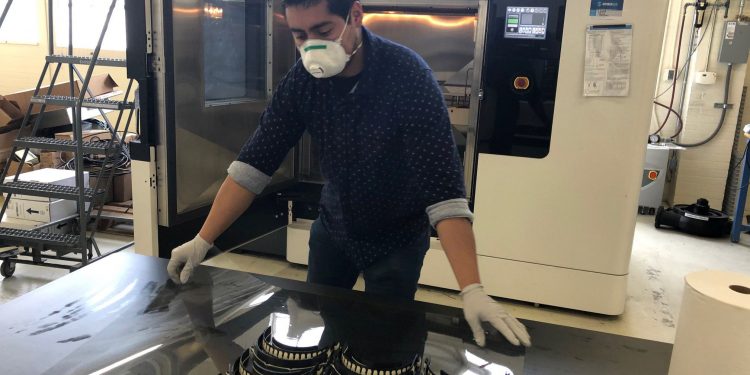Nine Department of Navy (DON) commands began 3-D printing medical face shields March 28 at the request of the Federal Emergency Management Agency (FEMA) Region VIII as part of the effort to combat the Coronavirus outbreak.
“Our goal is to make the detailed manufacturing technical data packages for medical supplies and personal protective gear available so any agency can download and print them. Combating COVID-19 is an all hands effort, and we are honored to be part of it,” said Liz McMichael, Naval Air Systems Command (NAVAIR) Additive Manufacturing Integrated Program Team lead.
The initial request came from FEMA and University of Colorado Anshutz representatives who reached out to the Marine Corps Advanced Manufacturing Operations Cell (AMOC), which in turn contacted the DON distributed manufacturing network to request production of 220 face shields.
“When FEMA Region VIII was building their team, we were fortunate to get plugged into their efforts. Every AM producer I reached out to stepped up. It speaks volumes of our additive manufacturing community that every group was confident that they could produce the entire request on their own. We broke it up to distribute the load,” said Marine Capt. Matthew Audette, Advanced Manufacturing Project Officer at the AMOC.
In a March 31 memo, Assistant Secretary for the Navy (Research, Development and Acquisition) James F. Geurts authorized all activities to support requests from FEMA.
“Our country is in a National Emergency so the Naval Research, Development and Acquisition community must engage accordingly. Effective and timely response to our communities must be prioritized to the extent the law permits,” Geurts said in the memo.
The Navy and Marine Corps have partnered with America Makes—a national manufacturing institute—to integrate government and commercial manufacturing capacity into a distributing manufacturing network to respond to urgent supply needs.
America Makes created a COVID-19 support site to identify critical medical supply shortages associated with COVID-19 and match them with available manufacturing capacity.
“The reason additive manufacturing is so perfect for this issue is that it’s a liquid asset stock. When supply lines for a specific component are strained, a spool of 3-D printer filament can be the bracket for a face shield, a wrench, a valve or whatever else may be needed at that time,” said Scott Ziv, an engineer in Naval Surface Warfare Center (NSWC) Carderock Division’s Additive Manufacturing Project Office.
The DoN is working across the DOD and with industry partners to determine the volume and scope of AM requests, the capacity to manufacture and distribute production across sites and ensure quality standards.
Faculty and active-duty personnel at the Center for Additive Manufacturing at the Naval Postgraduate School (NPS) responded to the request immediately.
“During the process we reached out to our local community and received the missing elements for the face shields. It was truly remarkable to see the network of people willing to help and support our mission. We are part of a large naval family and feel deeply connected with the local community that needs us now more than ever,” said Amela Sadagic, co-director, Center for Additive Manufacturing.
The following nine DON commands participated in the initial effort.
- Center for Additive Manufacturing and the RoboDojo MakerLab, Naval Postgraduate School, Monterey, California
- First Marine Logistics Group, I Marines Expeditionary Force, Camp Pendleton, California
- Indian Head Explosive Ordnance Disposal Technology Division, Marine Detachment, Indian Head, Maryland
- Marine Corps Advanced Manufacturing Operations Cell, Quantico, Virginia
- Marine Depot Maintenance Command, Marine Corps Logistics Command, Albany, Georgia
- Naval Air Systems Command and Naval Air Warfare Center Aircraft Division, Patuxent River, Maryland
- Naval Information Warfare Center Pacific (NIWC Pacific)
- Naval Surface Warfare Center Carderock Division, West Bethesda, Maryland
- Second Marine Logistics Group (2d MLG), II Marine Expeditionary Force, Camp Lejeune, North Carolina
“Marines are trained to take action in times of crisis. While we can’t be on the front lines of this fight” Second Marine Logistics Group stands ready to provide continued support in any capacity we can to equip those in critical need of medical supplies,” said 1st Lt. Alexander Walls, MakerSpace/Innovation Officer in Charge, 2d MLG.
Requests should be submitted to America Makes through its website at https://www.americamakes.us/
The Department of the Navy is currently working with a task force to facilitate critical supply needs for local and private partners across the nation.











